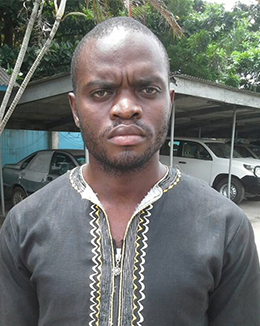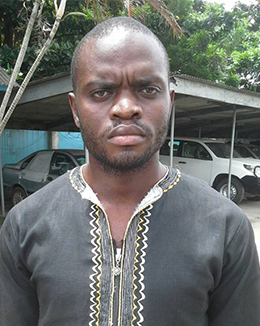Police arrested Mofor Ndong, the Bamenda-based publisher of the independent bi-monthly newspaper, Voice of the Voiceless, on February 9, 2017 in Buea, the capital of Cameroon’s English-speaking Southwest region, according to media reports.
Two other journalists — Guardian Post’s bureau chief Amos Fofung, whose house Ndong was staying at, and Atia Tilarious Azohnwi, political editor of the Cameroonian newspaper, The Sun, were arrested a few hours after Ndong, The Sun reported.

According to The Sun’s statement, when the paper’s managing editor Wasso Norbert Binde and editor Elah Geoffrey Mbong travelled to Buea to demand that authorities release the three journalists on February 10, 2017, they said that Ndong had a punctured lip and injuries to his feet.
Cameroon’s president’s office and the official government spokesperson did not immediately respond to CPJ’s request for comment.
Ndong admitted possession of pamphlets, according to The Sun. He was charged on July 14, 2017 with terrorism, propagation of false information, and rebellion, according to reports. Under Cameroon’s anti-terror law, the charges carry a maximum sentence of the death penalty. During a hearing at a military court in Yaoundé on August 22, 2017, Ndong was told that his trial was postponed until September 26, the journalist told CPJ.
On August 30, 2017, the office of President Paul Biya announced that Cameroon was ending criminal proceedings against 55 individuals detained during unrest in the country’s two English-speaking regions, including Ndong. At the time of his release. Ndong had spent more than eight months in jail. Three other journalists, including Azohnwi, were released under the same decree.
Police were allegedly monitoring Ndong at the time of his arrest because of an intelligence report that claimed the journalist planned to distribute pamphlets for the Southern Cameroons National Council–a political organization banned in January by authorities, according to a statement by The Sun and news reports.
In an interview with CPJ after his release from jail, Ndong said that the pamphlets police questioned him about were on the liberation of Southern Cameroons. “It contained no incitement to violence but only stipulated that there was no treaty between Southern Cameroons and La Republique Du Cameroon to be in a union. It urged Southern Cameroonians to be patient and wait for the UN to come and host their flag in Buea,” he told CPJ.
Ndong told CPJ that police also questioned him about two articles in Voice of the Voiceless, titled “Southern Cameroons Interim Government Advised Teachers and Lawyers to Suspend Strike Action” and “New Found Southern Cameroonian Leader Promises to Continue to Fight Until Victory is Achieved”.
The latter related to an interview with a Bamenda-based radio host turned activist named Mancho Bibixy. Bibixy was among the leaders in the English-speaking regions of Cameroon, arrested on January 19, and charged under Cameroon’s 2014 terrorism law, according to The Guardian.
Police also questioned Ndong about another article, titled “Southern Cameroons Denied Official Version of History,” he said.
Fofung told CPJ that police found copies of Ndong’s paper when they arrested him. “The newspaper he was caught with was used by the police as evidence of him,” Fofung, who was released without charge several months after his arrest, said.
Ndong started Voice of the Voiceless in June 2016 and had published 14 editions of the paper at the time of his arrest, the journalist told CPJ. An image of the front page of the second edition of the paper, published on the site’s Facebook page, shows that it has a pro-independence line and includes reports and commentaries on calls for greater autonomy in Cameroon’s English-speaking regions.
Ndong said that before his February arrest, authorities had issued a warrant for his arrest over an article he had published. The journalist told CPJ that he evaded arrest after receiving a tip off from a person he identified only as a “reliable source.” The journalist said police did not mention the warrant when he was arrested in February.
